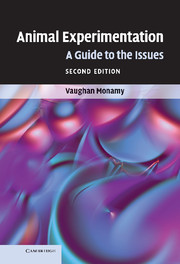Book contents
- Frontmatter
- Contents
- Preface to the second edition
- Acknowledgements
- 1 Issues in animal experimentation
- 2 A history of animal experimentation
- 3 Opposition to animal experimentation
- 4 The moral status of animals
- 5 Animal use
- 6 The regulation of experiments
- 7 Seeking alternatives
- 8 Conclusions
- Ethical guidelines for students in laboratory classes involving the use of animals or animal tissues
- References
- Index
8 - Conclusions
Published online by Cambridge University Press: 05 June 2012
- Frontmatter
- Contents
- Preface to the second edition
- Acknowledgements
- 1 Issues in animal experimentation
- 2 A history of animal experimentation
- 3 Opposition to animal experimentation
- 4 The moral status of animals
- 5 Animal use
- 6 The regulation of experiments
- 7 Seeking alternatives
- 8 Conclusions
- Ethical guidelines for students in laboratory classes involving the use of animals or animal tissues
- References
- Index
Summary
… [the most important issues in debate about animal experimentation are] the assessment of the scientific value of an experiment, of the knowledge or benefit to be gained, and of the suffering (if any) involved, and the question of how to balance these. It is ultimately a moral problem, and a question of responsibility borne both by the scientist and by the rest of society in the characteristically human task of removing ignorance and minimising suffering.
William Paton (1983, p. 104)THE CONSTRUCTION OF A MODERN RESEARCH INSTITUTION
In previous chapters, I have emphasised the need for moral consideration in all experiments which involve animals. Despite exhaustive attempts by scientists, theologians, humane philosophers and others to define a single ethical model for animal experimentation, none has proved comprehensive. This does not mean that such an ethic is not attainable – the difficulty lies in individual perceptions of other animals, and to what extent, if any, they ought to be included in our moral sphere. Albert Schweitzer's ‘reverence for life’ and Peter Singer's ‘animal interests’ are examples of ethics, derived in different ways, which have prepared the ground for the erection of the modern research institution. Now, and into the future, all such institutions will be staffed by scientists committed to using animals (and sentient animals in particular) in experiments only when it is absolutely necessary.
- Type
- Chapter
- Information
- Animal ExperimentationA Guide to the Issues, pp. 98 - 101Publisher: Cambridge University PressPrint publication year: 2009



